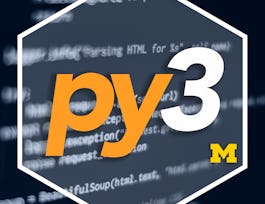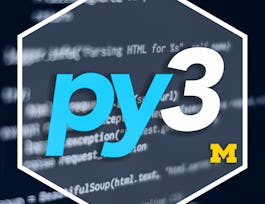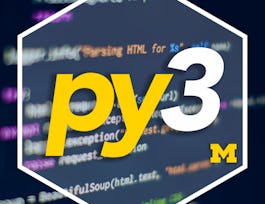This course introduces the dictionary data structure and user-defined functions. You’ll learn about local and global variables, optional and keyword parameter-passing, named functions and lambda expressions. You’ll also learn about Python’s sorted function and how to control the order in which it sorts by passing in another function as an input. For your final project, you’ll read in simulated social media data from a file, compute sentiment scores, and write out .csv files. It covers chapters 10-16 of the textbook “Fundamentals of Python Programming,” which is the accompanying text (optional and free) for this course.


Python Functions, Files, and Dictionaries
This course is part of Python 3 Programming Specialization
Taught in English
Some content may not be translated


Instructors: Paul Resnick
119,111 already enrolled
Included with 
Course
(5,221 reviews)
97%
What you'll learn
Explore the dictionary data structure and user-defined functions in Python.
Understand concepts like local and global variables, parameter-passing techniques, named functions, and lambda expressions.
Apply Python's sorted function and control sorting order with custom functions.
Create a final project involving social media data analysis and CSV file manipulation.
Skills you'll gain
Details to know

Add to your LinkedIn profile
4 quizzes
Course
(5,221 reviews)
97%
See how employees at top companies are mastering in-demand skills

Build your subject-matter expertise
- Learn new concepts from industry experts
- Gain a foundational understanding of a subject or tool
- Develop job-relevant skills with hands-on projects
- Earn a shareable career certificate


Earn a career certificate
Add this credential to your LinkedIn profile, resume, or CV
Share it on social media and in your performance review

There are 5 modules in this course
In week one the video lectures and the Runestone textbook will introduce you to the idea of incorporating files into your programs as an additional source of data. You will learn how to read from a file, write to a file, and how to work with the .csv data format.
What's included
14 videos15 readings1 quiz2 app items
In week two the video lectures and the Runestone textbook will focus on a new data type, dictionaries. You will be introduced to the mechanics of dictionaries and then get practice using them in accumulation patterns, both to build a dictionary using the pattern as well as find the best, or worst, result using the pattern.
What's included
10 videos9 readings1 quiz3 app items
In week three you will be introduced to the construction of functions. Up to this point, you have used functions in the programs before, but have not had a chance to write your own functions, including how to define a function, how to incorporate parameters, how to return data from a function, the local or global scope of variables, and potential side effects that could occur from function execution. Finally, we look at tuples more in depth, and how automatic packing and unpacking of tuples can be used in functions and in for loops.
What's included
16 videos19 readings1 quiz3 app items
In week four the video lectures and the Runestone textbook will outline a more advanced iteration mechanism, the while loop. You will be introduced to using it when getting feedback from users, as well as applying it to the turtle module to draw images. Additionally, you will also be exposed to more advanced function concepts such as the idea of parameters being optional, not required, and anonymous functions using lambda.
What's included
7 videos10 readings1 quiz3 app items
In week five the videos and Runestone textbook will detail how to sort python objects - both the basics and more advanced forms of sorting for dictionaries and how to break a tie (if that occurs). The final course assessment will be a project that asks you to read fake, auto-generated data from a social media site to analyze social media post sentiments. You will submit a csv file as well as images of graphs that demonstrate your findings.
What's included
11 videos8 readings1 peer review3 app items
Instructors


Offered by
Recommended if you're interested in Software Development

University of Michigan

University of Michigan

University of Michigan

University of Michigan
Prepare for a degree
Taking this course by University of Michigan may provide you with a preview of the topics, materials and instructors in a related degree program which can help you decide if the topic or university is right for you.
Why people choose Coursera for their career




Learner reviews
Showing 3 of 5221
5,221 reviews
- 5 stars
87.27%
- 4 stars
11.13%
- 3 stars
1.18%
- 2 stars
0.15%
- 1 star
0.24%
New to Software Development? Start here.

Open new doors with Coursera Plus
Unlimited access to 7,000+ world-class courses, hands-on projects, and job-ready certificate programs - all included in your subscription
Advance your career with an online degree
Earn a degree from world-class universities - 100% online
Join over 3,400 global companies that choose Coursera for Business
Upskill your employees to excel in the digital economy
Frequently asked questions
Access to lectures and assignments depends on your type of enrollment. If you take a course in audit mode, you will be able to see most course materials for free. To access graded assignments and to earn a Certificate, you will need to purchase the Certificate experience, during or after your audit. If you don't see the audit option:
The course may not offer an audit option. You can try a Free Trial instead, or apply for Financial Aid.
The course may offer 'Full Course, No Certificate' instead. This option lets you see all course materials, submit required assessments, and get a final grade. This also means that you will not be able to purchase a Certificate experience.
When you enroll in the course, you get access to all of the courses in the Specialization, and you earn a certificate when you complete the work. Your electronic Certificate will be added to your Accomplishments page - from there, you can print your Certificate or add it to your LinkedIn profile. If you only want to read and view the course content, you can audit the course for free.
If you subscribed, you get a 7-day free trial during which you can cancel at no penalty. After that, we don’t give refunds, but you can cancel your subscription at any time. See our full refund policy.

